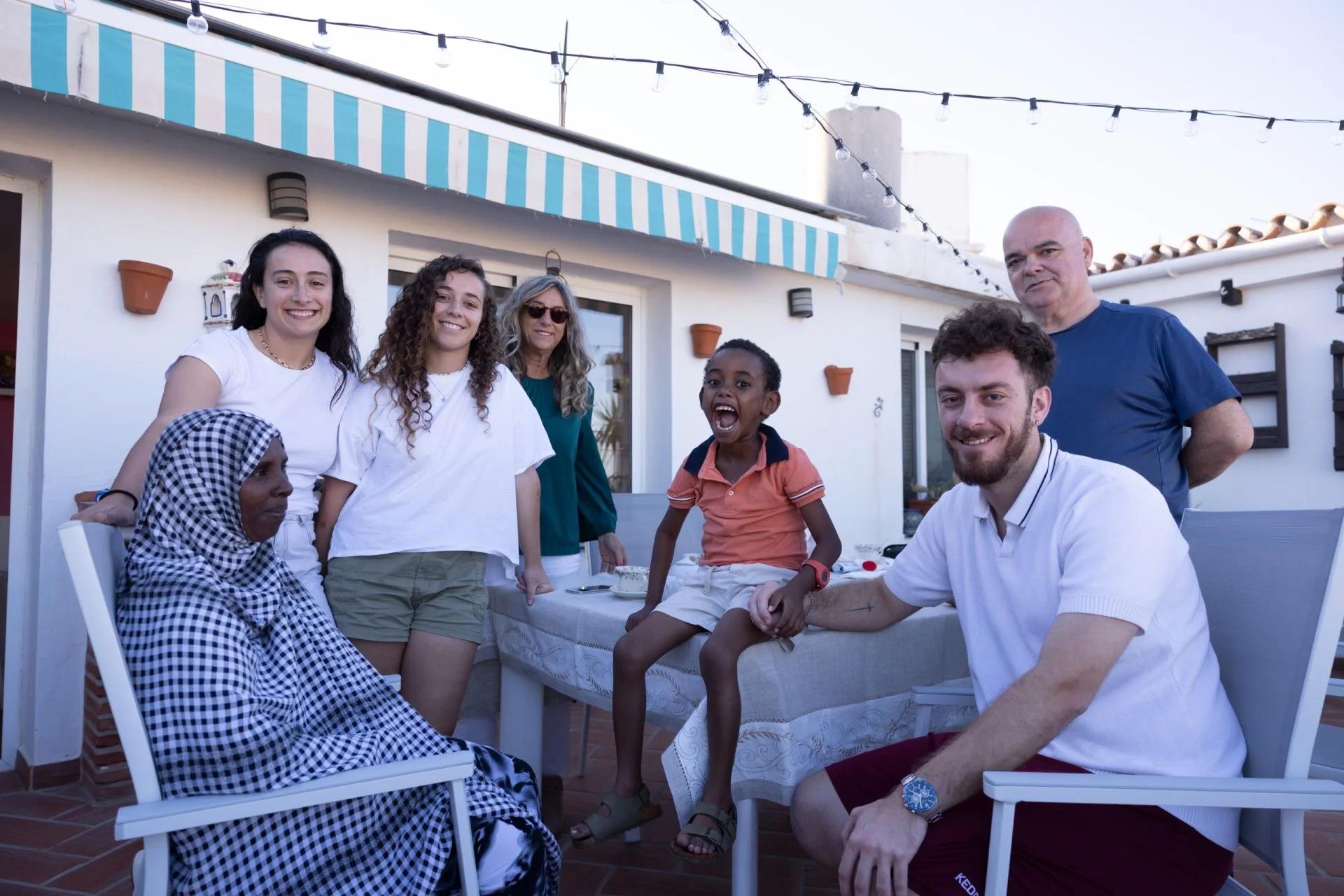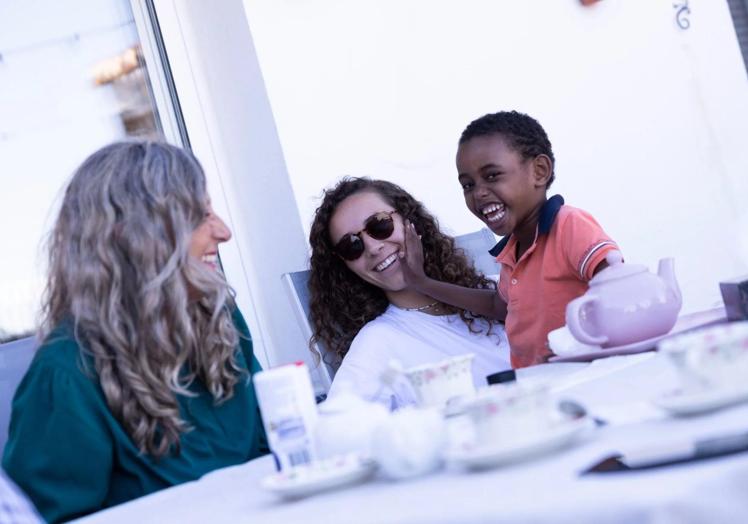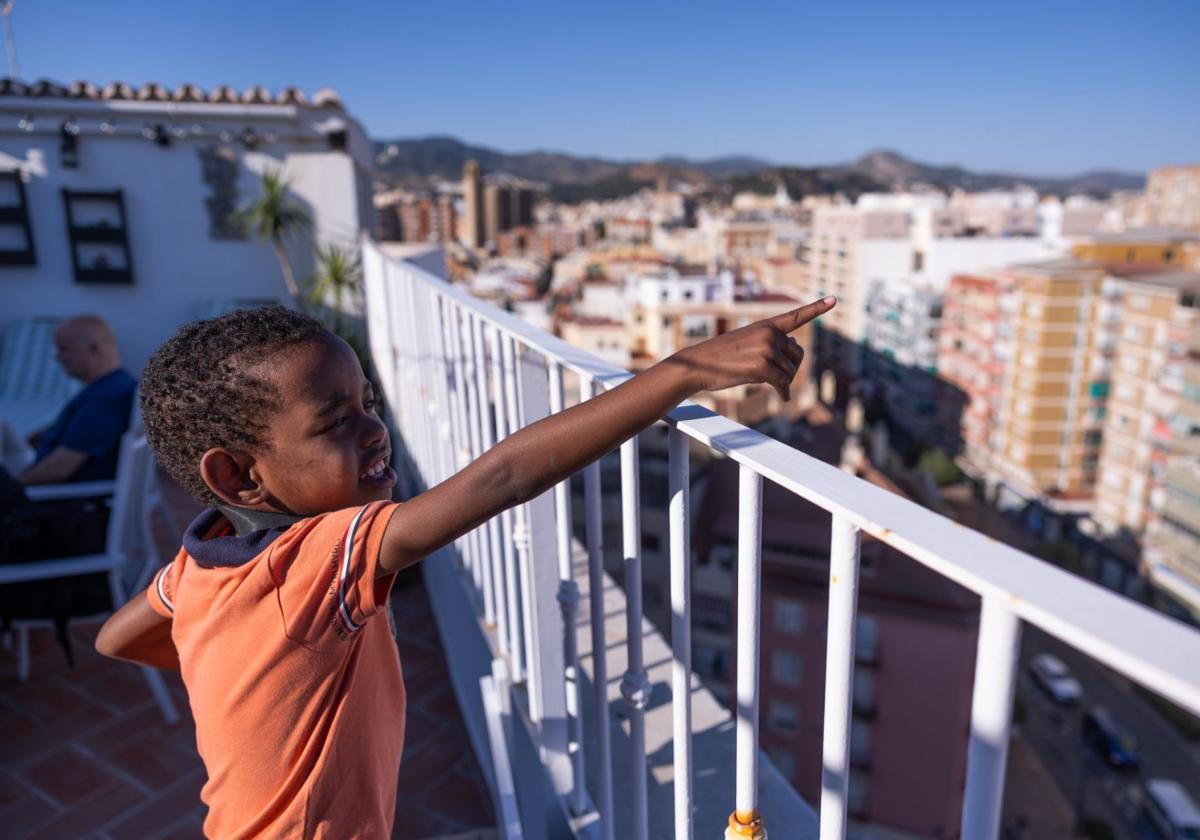Little Ali returns to Kenya after his life-saving heart operation in Malaga
A local family took in the young boy and his mother for three months so that he could undergo the surgery at the city's Hospital Materno
Although Alí has lost muscle mass due to his stay and recovery in a hospital's intensive care unit, following a very delicate heart operation, he can now be a normal six-year-old boy - curious, energetic and sociable, a fan of Paw Patrol, Fireman Sam, motorbikes and anything with wheels. He is still fragile and light as a feather, with a scar visible under his polo shirt, but his stay in Malaga, made possible thanks to a local family, has saved the life of the little boy from Kenya.
SUR met with Alí, his mother Hawa and the family that hosted them for three months on a beautiful Monday at the start of the summer. They gathered on the balcony of the family house, located close to the city's María Zambrano train station. Miming a pair of binoculars with fingers, Alí expresses himself with his hands, as he does not have enough vocabulary in Spanish. But he does understand everything and whatever he knows in Spanish, he says it with a Malaga accent. The first thing he says is "no veah". The reason why will come clear later.
His parents' worries started when they noticed that he would get very tired and sweat a lot. These initial symptoms led to an asthma diagnosis, which was later dismissed when a cardiologist from Granada attended the health centre in Kenya with which the NGO Infrancia Solidaria collaborates. According to the Spanish doctor, the child suffered from an ailment related to the heart, not the respiratory system.
It turned out that Alí needed an urgent surgery, as his life was at risk. That was when the mobilisation began: the NGO presented the case to the Hospital Materno Infantil in Malaga, appealed to the cooperation fund of the Junta de Andalucía, which in turn verified that the operation could not be carried out in his country. From that point onwards, the bureaucracy process was activated so that Alí and his mother could receive the necessary visas. As soon as Hawa learned that they needed to travel to Spain, she gave a firm "yes".
Infancia Solidaria makes sure that the children under 14 years of age do not come unaccompanied, so it is usually the mother or a grandmother that comes as well. Male relatives who have sometimes accompanied the children have reportedly had a bad experiences, because their sense of attachment and their involvement has perhaps been weaker.

The rest of Alí's family stayed in Kenya, while he and his mother came to Malaga. There was one piece missing: a foster home, someone who could provide a room for the two of them. That's where Mariángeles Ramos came to the rescue. It was not the best time for her to take on such a responsibility, but given the urgency of the case she couldn't say no to Infancia Solidaria. Moreover, she knew she could count on her family: her son Pepe, 26, her daughter Ángela, 24, and Ángela's partner Elena. The four of them formed a team that has been taking care of Hawa and Alí since they arrived in Malaga at the end of February.
On 1 April, the child underwent the surgery, which went perfectly. However, he had to spend a whole month at the hospital, three weeks of which were spent in the ICU. He was discharged from the hospital at the start of May, and now he has a few days left to make a full recovery and go back home. Mariángeles's household has not only saved his life, but also marked and changed it forever. Hawa's too. On 11 June, the two of them are leaving for Kenya.
'Like a little brother'
The family team took turns at the hospital to relieve the mother so that she could rest for a few hours every day. Then, when the little boy was discharged, they pampered him and took him to the park, to the shopping centre, to the beach. "He's like a little brother," says Ángela. Here, Ali has the happy life of any child who has regained his joy and health. "We play the role of grandparents who spoil him. Sometimes we joke that we are the good cop and Hawa is the bad cop," laughs Mariángeles.
Mariángeles also had to ensure that her authority was respected. What caused a little bit of friction was a cultural class: Alí is not used to women being in charge, so he rebelled against Mariángeles at first, until one day she explained to him that she is the boss of the house. She is the 'mamma' - a Mediterranean mother who organises her house, her children, and who is free and empowered outside her home. That was the day Alí, understanding everything, stood at attention, just as he does in the Scouts, of which he's a member in his village, before Mariángeles, while saying in his charming voice: "No veah" (a colloquial way of saying "Wow, man!").

"We didn't speak the same language, but we understood each other in the language we created. She is Muslim. I told her that I don't believe in any god, but that I was going to pray with all my energy that the child would get well"
The little boy's stay in the hospital was very hard for everyone, especially for Hawa and Mariángeles. To clear their heads, the two of them would go to the promenade in the evening. "We didn't speak the same language, but we understood each other in the language we created. She is Muslim. I told her that I don't believe in any god, but that I was going to pray with all my energy that the child would get well. Hawa replied that that was what she wanted, that we should all pray for him, because in the end we all wanted the same thing, whether we were believers or not," says Mariángeles. "Hawa has told me many things about her life in Kenya. Their family has a farm and they have work and income when it rains, but there is nothing during times of drought."
Gender inequality is still dominant throughout the world. Hawa was shocked by the fact that women can walk alone in Malaga; that in the evening along the promenade there are girls or grandmothers doing sports or walking quietly. This feels more normal to her now, just like greeting men with two kisses. She has learnt that Spanish and Malaga culture is very much about expressing affection physically. Maybe something might change in her village when she goes back and tells her story - maybe women will also be able to walk on their own and have a bit more autonomy and freedom.
'She has already realised that I'm in charge here'
Mariángeles wants Hawa to return to her village empowered: "She has already realised that I'm in charge here." It won't be easy, but Hawa already says that when she returns home and talks to her friends she will tell them that life in Spain is very good and that she and her son have been well looked after.
One can tell that Hawa is happy to see her child running around all the time, although she is very discreet and restrained in the way she expresses herself. She has that kind of elegance, the best kind, the kind that comes naturally. She has started to refer to Mariángeles as her "best friend". Alí's Malaga "family" is already planning on visiting them in Kenya this coming Christmas. Hawa has promised to build them a house in the village so that she could receive them. "Mine is not like this one," Hawa told Mariángeles, modestly and a little bit embarrassed.
-k8wC-U2302001697351VSF-624x385@Diario%20Sur.jpg)
Alí plays while the grown-ups talk. He has already gotten used to routines that were new to him when he first arrived: the light comes on at the flip of a switch; the escalators in shopping centres; or the beauty of travelling by train. "He loves motorbikes, but he's scared of the big ones. A friend came with a huge one and offered him a ride and he declined the offer with the excuse that the doctor had told him it wasn't 'good' for him, pointing to his chest and scar," says Mariángeles. Alí dreams of being "a police officer with a motorbike" when he grows up.
In a few days, Mariángeles and her children will say goodbye to Alí and Hawa. They will tattoo a heart in memory of how their new friend's heart has healed. It has been a life-changing experience for both the foster family and the little boy.



Comentar es una ventaja exclusiva para registrados
¿Ya eres registrado?
Inicia sesiónNecesitas ser suscriptor para poder votar.